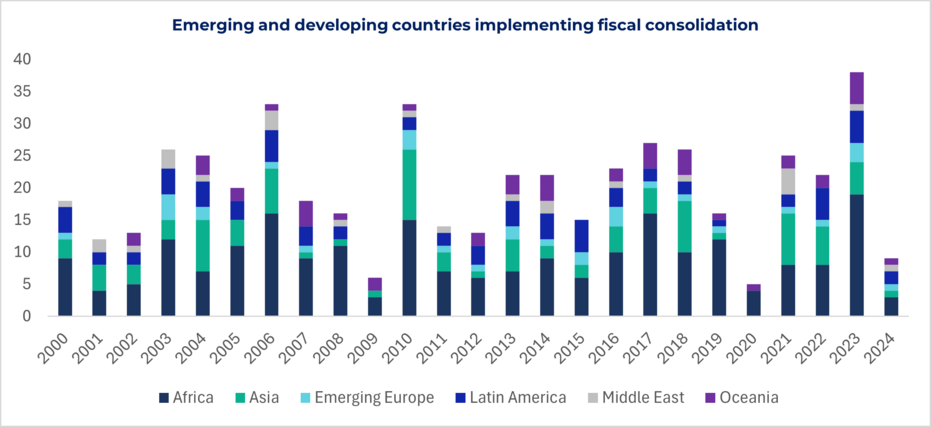Faced with soaring debt and growing pressure to consolidate public finances, austerity is becoming the norm in many emerging and developing countries. However, contrary to popular belief, these measures do not systematically trigger waves of protest. We take a closer look at this complex reality.
Austerity: a global response to the debt crisis
Since the 2008 financial crisis, global public debt has almost doubled, reaching a record high of $102 trillion in 2024. This increase is particularly marked in developing economies, where debt has grown twice as fast as in advanced countries. The rising cost of debt points to a wave of austerity in the form of budget cuts or tax increases.


data for the graph in xls format
A contrasting reality across regions and countries
The impact of austerity on social stability varies considerably from one region to another and can sometimes be deeply destabilising. In Ecuador, for example, the removal of fuel subsidies in 2019 paralysed the country for ten days, forcing the government to back down. In Kenya, tax increases in 2024 sparked riots that led to the storming of Parliament, forcing President Ruto to withdraw the finance bill and enter into dialogue with the opposition.
However, our study reveals that austerity measures do not systematically trigger social unrest. In lower-income countries in Africa and the Middle East, the implementation of fiscal adjustment plans is often accompanied by a decline in protests.
The weight of inequality and governance
The acceptance or rejection of austerity depends heavily on the level of inequality and trust in institutions. In countries with marked social disparities and weak safety nets, tensions are more frequent, as the current situation in Kenya shows. Conversely, in contexts where governance is improving, calm can be restored: in Sri Lanka, after a major political crisis in 2022, the arrival of a new anti-corruption government in 2024 helped to reduce tensions.
Cuts or taxes : choices that matter
The nature of austerity measures also influences social reactions. In Latin America, where more than 90% of plans include tax increases, protests are often immediate. Conversely, in emerging countries in Asia and Europe, governments generally favour cuts in public spending, which tend to provoke fewer social reactions in the short term.
Download the full study now
(.pdf 4,13 Mo)



